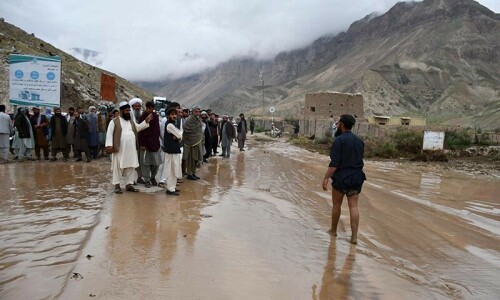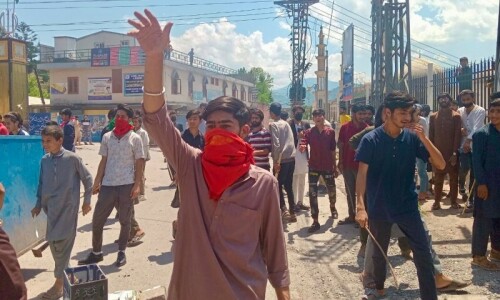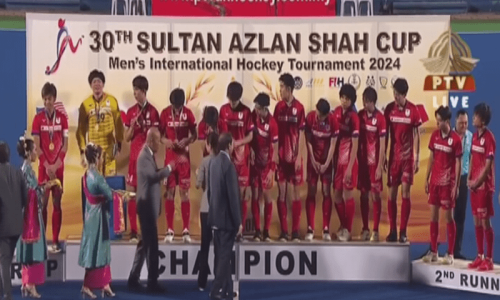TOKYO: Near-simultaneous leadership changes in China, Japan and South Korea offer East Asia a fresh start after a period of tension, say analysts, despite the hawkish pedigree of those coming to power.
After elections in Tokyo and Seoul this week and with Beijing's leadership tussles resolved by last month’s Communist Party conference, the region's three biggest economies could be over a hump.
All three new leaders have less incentive to play to their galleries freeing them to be more pragmatic in their dealings abroad, said Zhou Weihong, a Japan specialist at Beijing Foreign Studies University.
“Relations should generally turn better” he said. “There likely will be more room for cooperation between China, Japan and South Korea.” All three face problems from the stumbling world economy and the successful launch of a North Korean rocket last week adds to regional uncertainty.
Japan's presumptive prime minister Shinzo Abe spent much of his campaign talking tough on China and proclaimed after his victory there could be “no negotiation” over the sovereignty of islands that both sides claim.
The spat blistered in September when Tokyo nationalised the chain.
China sent government boats into the archipelago's territorial waters almost every day until Sunday's polls, and upped the ante last week with a flypast, in what Japan said was the first Chinese breach of its airspace since at least 1958.
But Tokyo's well-equipped coastguard has not reported any Chinese ships in immediate waters since the poll, won by Abe's Liberal Democratic Party.
The Democratic Party of Japan they displaced had proved something of an enigma to friends and foes alike during their three years in power.
Washington insiders privately complained they were difficult to understand and Beijing sometimes struggled.
Commentators say an LDP government will be easier to deal with.
“The DPJ has been locked in a logjam with China. But the LDP has communication channels and contacts with China that it developed through decades of exchanges” during its more than half a century rule, said Zhou.
“It would probably be easier for it to mend fences with China.” Tokyo's relations with Seoul had been on the up; they had a currency swap in place, cultural exchanges and a near-miss on the signing of an intelligence-sharing deal.
But things fell apart after South Korean President Lee Myung-Bak opened old wounds over disputed islands.
There followed accusations that Tokyo was not sorry enough for its wartime behaviour and demands to compensate women forced into sexual slavery.
The election on Wednesday of conservative Park Geun-Hye, the daughter of former military ruler Park Chung-Hee, marks an opportunity to get ties back on track, said Korea University professor Lee Nae-Young.
He points out that Park's father worked with Abe's grandfather — former Prime Minister Nobusuke Kishi who was arrested, though never charged, for war crimes — to normalise bilateral diplomatic relations in 1965.
“Like her father who had strengthened ties with the US and Japan, president-elect Park Geun-Hye is expected to seek better relations with the two allies,” Lee said.
“It's not easy for Park to make concessions on territorial disputes, but her balanced diplomatic policy will contribute to regional stability,” Lee said, adding she would be looking to China as “a strategic partner.” Park takes office in February, a month before Xi Jinping is formally elevated to the post of Chinese president.
For Xi, the son of a senior Communist party apparatchik, that stability is a vital goal, say commentators.
Beijing would like Seoul to stop poking the hornet's nest of Pyongyang, said Zhou, which might help to calm its unpredictable ally.
“Lee Myung-Bak was a hardliner... but Park Geun-Hye is more rational and is likely to take a more flexible policy on North Korea.
“It is likely to be easier for China, Japan and South Korea to coordinate once a (South Korean) leader who adopts a more tolerant policy on North Korea takes power,” he said.
Masao Okonogi, honorary professor at Keio University in Tokyo, said one thing for sure was that 2013 would be a busy one.
“Diplomacy in East Asia will become even more dynamic,” he said. “As a reflection of the underlying tension, diplomacy could become more active.”—AFP













































Dear visitor, the comments section is undergoing an overhaul and will return soon.